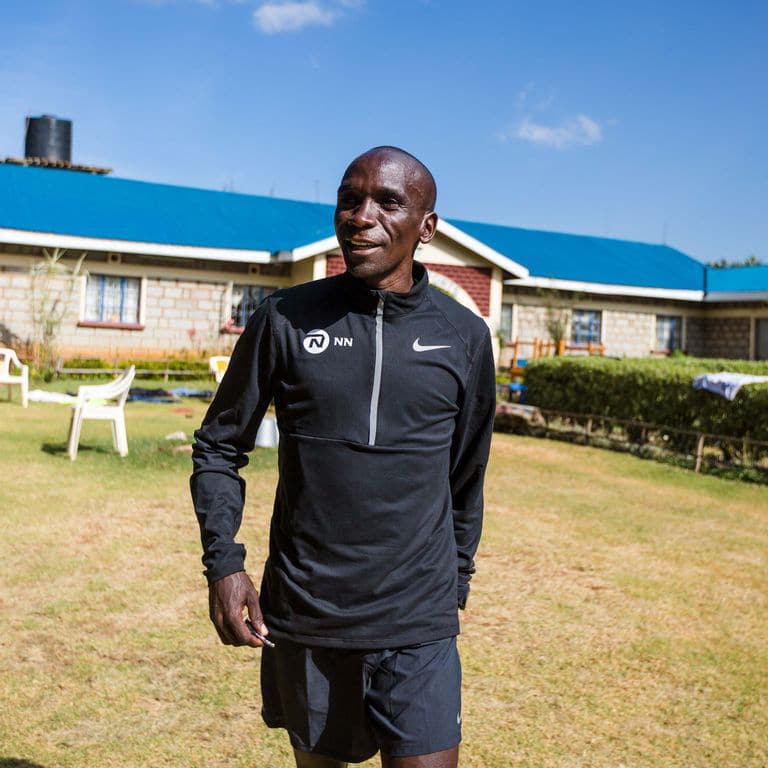On his bedside table in Kaptagat, Kenya, Eliud Kipchoge has a book: A New Earth by Eckhart Tolle.
The central theme of it is that the best way to achieve happiness is by living in the moment, without emphasising material possession – an edict the greatest marathoner in history has long followed.
As the reigning Olympic marathon champion and world record holder, the 34-year-old could easily luxuriate in the fame, adulation, and wealth that his achievements have brought, but that’s not how he works. To stay at the front, he only looks ahead. Kipchoge compares competing in running to driving a Ferrari.
“If you concentrate on the rear mirror,” he told Runner’s World, “you’ll crash and cause an accident.”
It’s been almost six years since he was beaten in a marathon – his sole defeat was finishing runner-up to Wilson Kipsang in 2013 in Berlin – but on Sunday morning, 28 April, in London, he will face what could be the toughest test of his career.
Since no man has ever won the London Marathon four times (Norway’s Ingrid Kristiansen is the only woman to accomplish the feat), Kipchoge knows he’s about to enter uncharted waters.
“My preparation has been good. I am fit,” he said. “I think I will have a good result.”
At the Berlin Marathon last year, his 2:01:39 carved a whopping 78 seconds off Dennis Kimetto’s world record, plugging the one hole on his resume. “Before Berlin I was not complete,” he said. Of course, these days no athlete can take a world record into the stratosphere without suspicion coming along for the ride. Unsurprisingly, in the aftermath of the Kenyan’s jaw-dropping performance, some in the running community didn’t believe what they’d seen.
“I tell those who are truly skeptical that they need to see our training, what we are doing for the whole week and then compare the [practice] times [to races],” he said. “We are working even harder in training.”
No Shortcuts to Training
Kipchoge’s been at the top of the distance running rankings for almost 16 years. He burst on the scene in 2003, when he won the world 5,000-metre title at just 18 years old. After all that time competing at the highest level in a sport often riddled with doping accusations, he has a strong message for young athletes.
“You can win clean, you can compete clean and you can live in this world in a clean way,” he said. “The worst thing ever is if you use drugs, if you use a shortcut because even if you perform you will not sleep in a good way. If you know that you cheated, you are not at peace.”
When he returned to Kenya from Berlin last fall, many in his home country were keen to hold a public parade, but Kipchoge preferred a more modest approach. “It was just a small celebration with friends and family,” he said. He took a full month off running before beginning training again in late October.
“In the off season I allow my body to recover, my mind to recover,” he said. “I like to be with my family, to read books, and know what is going on in the world, to understand how people think.”
In November he visited China and Japan, spreading his own gospel to young people about the value of a well-structured life.
“They should say ‘no’ to anything that can destroy them, have self-discipline throughout their lifestyle,” he said. “And above all, believe in themselves.”
Mind of a Champion
In terms of self-confidence and faith in himself, Kipchoge has unshakeable strength, developed through decades of hard work and by digesting countless books on self-help and psychology. The key to breaking down athletic barriers, he noted, is keeping your mind as sharp as your body. “If you want to break through, your mind should be able to control your body,” he said. “Your mind should be a part of your fitness.”
One way Kipchoge achieves this mental fitness is by stripping down most of the day-to-day stressors and distractions outside of running that can tempt and tire out his brain. On the build-up to marathons, he restricts himself to a monastic routine. Though he can afford to live luxuriously, he resides in very basic conditions at his training camp, sharing a small twin room and simplifying his life to have everything he needs and no more.
“You know, I was brought up in a humble background,” he says. “To [succeed in] sport doesn’t need any high-profile place to live.”
Kipchoge grew up in Kapsisiywa, a small village in Nandi County, and was fortunate to count Patrick Sang, an Olympic silver medalist in the 3,000-metre steeplechase who would become one of the world’s great distance-running gurus after retiring from track, among his neighbours.
He was and is Kipchoge’s first and only coach. “I can’t compare him with anyone,” Kipchoge said. “He’s the best coach in the world.” Along with training brilliance, Sang bestowed on Kipchoge the value of simplicity.
At his home in Eldoret, where Kipchoge’s wife, Grace, lives with their three children, he could easily prepare for races in comfort, but instead he spends six days a week at the Kaptagat camp, where the roster of duties could see him cleaning toilets one day and sweeping halls the next. This is all part of the training, though, he explained. “The more you are in your comfort zone, the more you lose [in the race].”
At the core of his mentality is a laser-focused commitment that turns on and off like a light switch. Once his preparation for London began, he was all-in.
To train for the late-April race, Kipchoge ran 190-210 kilometres each week that included three workouts: a track session, fartlek, and long tempo run. “The day I start [marathon training], I am purely on preparation and treating every day as an important day,” he said. “I don’t miss training, I don’t miss any exercise.”
Saving Some for the Race
His training partners will sometimes bury themselves trying to keep pace, but Kipchoge never digs too deep. At least until race day. “I have been doing all things at 80 percent,” he noted. “Once in a while you can run very fast, but you cannot always go to the maximum.”
Training consistently in his wheelhouse has allowed him to stay healthy and remain peerless in the marathon – an event where the world’s best are so often reduced to wreckage.
And Kipchoge just keeps winning. In London on Sunday, he will target his 10th straight marathon victory (11 if we count Nike’s Breaking2 event in Monza, Italy, where Kipchoge ran 2:00:25, a time that was ineligible for record purposes). He may speak with the polite manners of a bellboy, but make no mistake: on race day, Kipchoge rules the roads.
There was Berlin in 2015, when he ran the majority of the race with his insoles hanging loose and still finished 81 seconds clear of the runner-up; there was Rio in 2016 where, despite oppressive heat, he cruised to Olympic gold with more than a minute to spare. During his three wins in London – 2015, 2016 and 2018 – he charged to the finish with such strength and speed that it became hard to envision his reign ever ending.
But if all that was good, his most recent work last September was his true masterpiece. Though Kipchoge had to race Berlin alone from just after halfway, he maintained a meditative, tranquil trance over the closing kilometres and ran straight into the record books. His finish time, 2:01:39, equated to a mind-boggling 2:52 average per kilometre.
To win on Sunday, however, he will need to be at his best.
Looking Ahead to London
At the London Marathon, he faces former world record holder Wilson Kipsang of Kenya and Shura Kitata of Ethiopia, who was just 32 seconds behind Kipchoge when runner-up last year. The most dangerous threat may be Britain’s Mo Farah, the four-time Olympic champion on the track who is slowly mastering the marathon.
“Mo Farah is a strong athlete,” said Kipchoge, who watched Farah’s victory in Chicago last October from afar. “With all the people of the United Kingdom on the streets, he’ll have a big run on Sunday.”
When he arrives on the starting line, Kipchoge will live in the present, aware that past achievements and accolades count for nothing. Now that the world record is his, Kipchoge will be not be looking at the clock, but at his rivals.
“It’s purely [about] coming home first,” he said.

